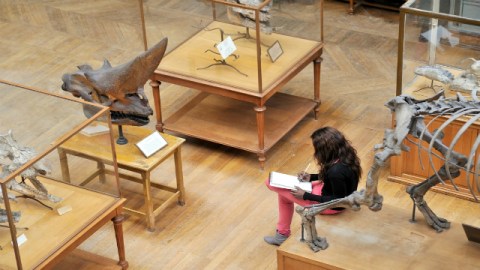What Is “Real Scientific Understanding”?

If I were asked, “do you believe that human beings evolved millions of years ago from ancestors shared in common with gorillas and chimpanzees?” I would answer emphatically and unequivocally: yes. But I know very little about evolutionary biology. Why am I so emphatic and unequivocal if I am so ignorant?
Before addressing this question directly, let me first note that I am not entirely ignorant in this area. I think I’ve watched two or three NOVA episodes dealing with evolution, I’ve been to the Hall of Human Origins at the Museum of Natural History in New York probably five times, and I’ve even read some books about the political history of the theory of evolution. The 1960 movie version of Inherit the Wind has been a favorite of mine since I first watched it in one of my high school science classes.
But I don’t have anything like the real scientific understanding of human evolution that an evolutionary biologist presumably enjoys.
What is “real scientific understanding”?
Someone with real scientific understanding of human evolution will walk into the Hall of Human Origins and be able to make a variety of sophisticated judgments about what is presented and how it is presented. She will be able to surmise the choices made by the curators. She will be able to imagine what such an exhibit might have looked like 30 years ago. She might say about one part of the exhibit, “there is some recent research that complicates this account.” Or, “they’ve left out something crucial!”
Each bit of information will trigger a network of associations that include the names of the scientists who contributed to the research behind it, the nature of their research, what critical reviewers have said about it, and unanswered questions that it has stimulated, which require more research. In general, each bit of information is a hyperlink connecting to a web in her mind of concepts, hypotheses, academic journals, books, scientists, institutions, and so on – all anchored in a vivid mental picture of specimens, excavations, computer modeling programs, museum archives, and so forth.
This, anyway, is how I imagine the experience of a person with real scientific understanding.
And if this is what it is like to have real scientific understanding, then I can say with certainty that I don’t have any. I walk through the Hall of Human Origins and the cartoon bubble above my head reads: “wow!” “fascinating!” “awesome!” “wait, …huh?” That’s right, my reaction is not unlike that of a chimp in the produce section of a grocery store.
I merely consume what I take to be the juicy back-story of human history. To be sure, this particular exhibit presents a lot of information about how evolutionary biologists have come to their conclusions, but I usually skip that part and go right to the life-size dioramas. My favorite is the model of two Australopithecines walking side-by-side. I find it romantic.
What, then, accounts for my assumption that the statement, “human beings evolved millions of years ago from ancestors shared in common with gorillas and chimpanzees,” is true? And why should I be so emphatic and unequivocal about it?
Here are a few thoughts:
Upbringing. When I was growing up no one ever used non-naturalistic reasons to explain anything. No one ever said casually, “this is God’s plan” or “it was a miracle.” No one ever suggested that if I wanted to achieve something I should “pray about it” or take serious precautions to avoid any encounters with a black cat. It’s not that we didn’t go to synagogue from time to time and formally enunciate all manner of praise to the God of Abraham, Isaac, and Jacob – but no one would ever imagine that these performances had anything to do with nature. On the other hand, I don’t remember anyone specifically espousing the theory of evolution in my direction. It was simply an unspoken assumption when I was growing up that nature follows its own laws and the experts on nature are called scientists. Naturally, when I learned that scientists explain the origin of human beings with the theory of evolution I believed it.
It’s Easier. I probably continued to take the scientific account of human origins for granted because nothing ever seemed to contradict it. Or, rather, no one that I took to be an expert on nature ever indicated that an alternative explanation might be plausible. It has always just seemed obvious to me and entertaining an alternative would require too much work and self-doubt to seem worth the effort.
Meaningfulness. Knowing that my biological ancestors have been eking-out evolutionary progress for millions of years has a quality of transcendence: it includes a humbling sense that there are arcs of connected action that transcend truly vast expanses of time and space, making my own everyday actions seem far less consequential than they appear. This knowledge also amplifies my self-understanding with narrative coherence on the grandest scale: I am a participant in the American story and in the Jewish story, but also in the hominid story!
Moral Insight. We should never make the mistake of thinking that our duty is merely to “follow our natural instincts.” But if we are a kind of animal then it is important for us to recognize that, like every other animal, we have a set of capabilities that require opportunities for exercise if we are going to have flourishing lives. If it is bad for a cheetah to spend his life locked in a small cage with no opportunities to run, there must be some state of affairs that is similarly bad for human beings – we should decide what we think it is and make sure that no human being is forced to endure it.
A good indication that the truth of human evolution is very important to me is that I am constantly reminding my niece and nephew, and my son, all of whom are under ten, “remember, we are related to monkeys!” I feel deeply compelled to pass on to them the story of their ancestors.
Sometimes I wonder if there is something reactionary – a kind of “orthodoxy” or “fundamentalism” – in my need to propagate intentionally what I learned as unspoken truth.





